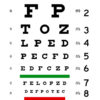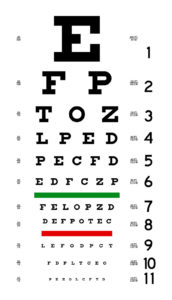
The Importance of Regular Eye Exams
Let’s face it: no one likes making appointments, much less going to them. Adding one more thing to the to-do list or taking time off work to go to a check-up of course makes them inconvenient. However, we cannot underestimate the importance of regular eye exams. Yes, it can be annoying to make the phone call and then show up to the office, but it is definitely worth it in the long run.
After all, most people wait until they experience problems with their vision to get an exam. At that point, it’s almost too late. Getting an eye exam can be the first step to fixing existing eye problems, but if you make sure you are visiting the eye doctor regularly, you can actually prevent these issues from ever popping up. The severity of vision deficits can also be prevented if they are caught early by regular eye exams.
Benefits of Regular Eye Exams
Here are some of the benefits of thorough eye exams:
 Adjusting Prescriptions for Corrective Lenses – Our eyes change over time and what was once the perfect diopter might be hurting your eyes now. Your doctor can help you with a current and precise prescription.
Adjusting Prescriptions for Corrective Lenses – Our eyes change over time and what was once the perfect diopter might be hurting your eyes now. Your doctor can help you with a current and precise prescription.- Checking Alignment – Eyes don’t always work in unison the way they are supposed to. In some cases, crossed or turned eyes can be putting undue strain on the muscles and nerves. Sometimes, one eye focuses differently than the other. In both instances, headaches and blurred vision are common symptoms. A doctor can help you correct these issues before they get out of hand.
- Eye Tone – Your eyes change focus due to the interaction of many small muscles. As you age, the tone of these minute muscles diminishes and your ability to focus suffers. When your eye doctor notices this, it’s a signal to start doing eye exercises at home.
- Retina Exam –The blood vessels of the retina are excellent indicators for diabetes and high blood pressure. A thorough eye exam can reveal results that go beyond vision.
- Checking for Glaucoma – Though painless, glaucoma can lead to other vision problems. Glaucoma usually has no symptoms of early onset. Doctors may detect and treat glaucoma before it becomes a serious problem.
How Often Should Eyes Be Examined?
The frequency of your optometrist visits is largely dictated by your age and the overall quality of your vision. In early adulthood, for example, you actually don’t need to visit the eye doctor as often as you do when you are a child or when you are older. As you may have noticed, it is rare to reach the age of 50 without requiring some form of corrective lenses. Plus, all people experience decreased visual acuity as they age.
Patients with healthy vision, or those who require adjustments of prescriptions, may visit the optometrist annually. Patients over the age of 40 or who have eye disease should visit more frequently. Nevertheless, here are a few guidelines:
- Until about 40 years of age, many people only need intermittent visits to the optometrist. After that, try to schedule a visit once every 18 months.
- Annual exams are recommended for patients over the age of 60, as the risks of glaucoma, cataracts, and macular degeneration increase.
- Diabetics must have an annual eye exam. Diabetic retinopathy patients need more frequent checkups. Diabetics are at a higher risk for most eye conditions. Diabetes-related retinopathy is the number one cause of blindness in American adults.
- Patients with contact lenses need the lenses evaluated annually to minimize their adverse effects. Lenses may damage the surface of the eye, even if they are helping you see correctly. Periodic intervention with contact lenses helps reduce the cumulative damage to your eyes.
- During childhood, annual exams are necessary since rapidly changing physiology can lead to sudden changes in vision. Children with vision problems may develop associated learning disabilities.
Of course, any time you experience an eye infection or changes in your vision, schedule an exam with a doctor.
What Happens During an Eye Exam?
If you’ve never had an eye exam, you might be a little nervous about it. But, there’s nothing to worry about. As long as you go to a reputable eye doctor, your eyes should be in good hands.
The first thing the eye doctor will do is ask about your medical history. They’ll want to know about past medical treatment, eye-related and not. They may also ask about any eye-related issues people in your family have experienced. Then, they’ll inquire about any symptoms you’re experiencing in your eyes. Are they burning? Dry? Do you often experience blurred vision? These are things the eye doctor needs to know.
Next, you’ll take a visual acuity test. Using the Snellen chart, your doctor will ask you to read out the different letters you see on the chart. They’ll then have you do an eye movement test. This is where you follow an object, like a pen, with your eyes but not your head. Some other tests they may insist on are glaucoma screening tests or retinal exams. Sometimes, these involve putting drops
Prevention Is Always the Best Medicine!
Regular vision exams are part of a proactive stance against vision problems. But, general health practices like exercise and a proper diet are also incredibly important for good vision. Consider taking a dietary supplement, like our Ocu-Plus Formula, for your vision and scheduling regular eye exams with your doctor for the best results.
Components of a vision-healthy diet include green, leafy greens such as kale and chard. You need to consume foods high in omega fatty acids, like fish as well as plant-based proteins. It’s also very important to eat foods high in antioxidants. If you find that your diet is deficient in the nutrients from these foods, you’re not alone. Many Americans struggle to get all the essential nutrients into their daily diets. You can supplement your diet with a regular, multi-purpose vitamin and other supplements, like omega-3 and -6 fatty acids.
Aerobic exercise improves circulation throughout your body and promotes the functioning of the tissue in your eyes. Try running, swimming, or bicycling for 30 minutes several times a week to increase your overall aerobic health.
Besides changing your diet and picking up a few exercises, there are things in your life that you can eliminate to improve your vision. Smoking, of course, is negatively implicated in many health problems, including vision deficits. Smoking increases the chances of cataracts, macular degeneration, and damage to the optic nerve. Many smokers find it difficult to quit, but the rewards are felt throughout your body.
Scheduling an Eye Exam
If your eyes haven’t been examined in a few years or you are experiencing vision problems, don’t hesitate to schedule a visit with your ophthalmologist. The sooner you understand the condition of your eyes, the sooner you can take proactive steps to improve your vision. Visiting the eye doctor once per year will help you preserve your vision, for life.
Our Rebuild Your Vision Ocu-Plus Formula Contains All 17 Vitamins, Minerals, and Herbal Supplements to Improve Your Eye Health!




It is good to know that children need eye exams every year. That way parents will realize that they need to take their kids to get their eyes checked out often. It would not be good for the child if he or she has to go through school without being able to see properly. That will just cause strain on the eyes which can make the problem worse!